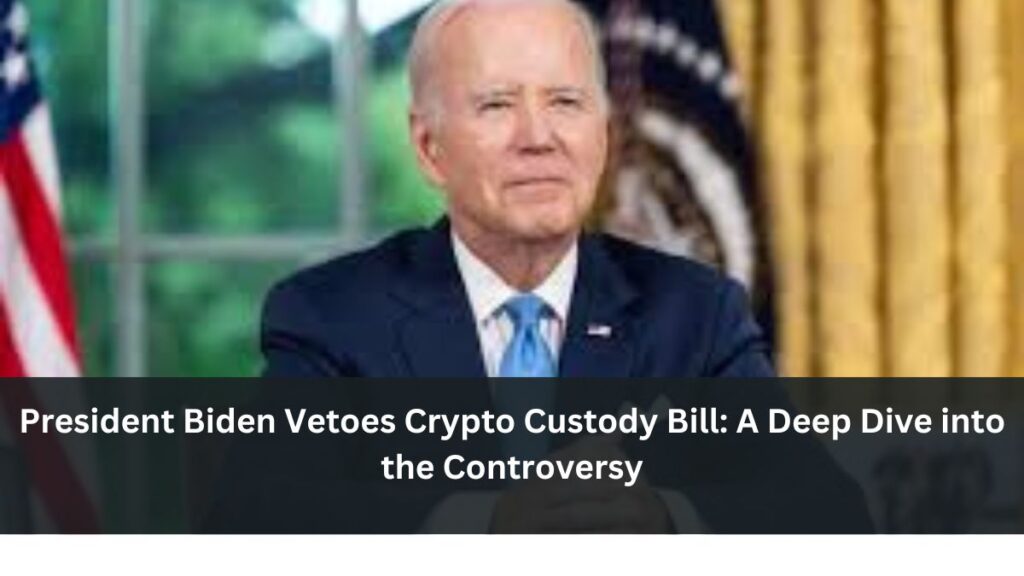In a significant move, President Joe Biden recently vetoed H.J.Res. 109, a congressional resolution aimed at overturning the Securities and Exchange Commission’s (SEC) current guidance on how banks should handle cryptocurrency assets. This decision has sparked considerable debate among lawmakers, banking groups, and the broader financial community. Here, we delve into the details of the veto, its implications, and the broader context of crypto regulation in the United States.
Understanding H.J.Res. 109 and SAB 121
The Core Issue: SEC’s Staff Accounting Bulletin 121
At the heart of this controversy is the SEC’s Staff Accounting Bulletin 121 (SAB 121). This bulletin provides guidance on the accounting treatment of customers’ crypto assets held by banks, effectively requiring these assets to be treated as liabilities on the banks’ balance sheets. The SEC argues that this approach is necessary to protect investors, especially in light of high-profile collapses in the crypto industry, such as the FTX debacle.
The Congressional Resolution: H.J.Res. 109
H.J.Res. 109, spearheaded by Republican Congressman Mike Flood, sought to overturn SAB 121. Proponents of the resolution, including many banking groups and financial industry lobbyists, argued that the SEC’s guidance makes it prohibitively expensive for banks to handle crypto assets. They claim that treating these assets as liabilities imposes undue financial burdens on banks, hindering their ability to offer digital asset custody services at scale.
The Veto and Its Rationale
Biden’s Justification
In his statement accompanying the veto, President Biden emphasized the need for stringent regulatory frameworks to protect consumers and investors. He argued that overturning SAB 121 would undermine the SEC’s ability to set appropriate guardrails for the crypto industry.
“SAB 121 reflects considered technical SEC staff views regarding the accounting obligations of certain firms that safeguard crypto-assets,” Biden said. “By virtue of invoking the Congressional Review Act, this Republican-led resolution would inappropriately constrain the SEC’s ability to set forth appropriate guardrails and address future issues.”
The Political Landscape
H.J.Res. 109 passed with considerable support from Republicans, but also garnered backing from 21 Democrats in the House and key figures like Senate Majority Leader Chuck Schumer. This bipartisan support highlights the contentious nature of crypto regulation, transcending typical party lines.
The Arguments For and Against SAB 121
Banking Groups and Industry Lobbyists
Organizations like the American Bankers Association (ABA) and the crypto advocacy group Stand With Crypto have been vocal opponents of SAB 121. In an open letter to President Biden, these groups argued that SAB 121’s requirement to treat custodied crypto assets as liabilities is misguided and counterproductive.
“SAB 121 effectively precludes regulated banking organizations from offering digital asset custody at scale since it treats the assets as if they are owned rather than simply custodied by a banking organization,” the letter stated. They contend that this accounting treatment imposes unnecessary financial constraints on banks, limiting their ability to innovate and compete in the burgeoning digital asset market.
Regulatory Perspectives
On the other hand, regulators and proponents of SAB 121 argue that stringent accounting standards are essential to safeguard the financial system and protect investors. The collapse of prominent crypto firms like FTX has underscored the risks associated with digital assets, highlighting the need for robust regulatory oversight.
The Path Forward: Collaborative Regulation
Biden’s Call for Comprehensive Regulation
Despite the veto, President Biden signaled openness to further discussions on crypto regulation. He emphasized the administration’s willingness to work with Congress to develop a balanced regulatory framework that promotes responsible innovation while protecting consumers and investors.
“My Administration is eager to work with the Congress to ensure a comprehensive and balanced regulatory framework for digital assets, building on existing authorities, which will promote the responsible development of digital assets and payment innovation and help reinforce United States leadership in the global financial system,” Biden stated.
The Need for Balanced Regulation
The veto of H.J.Res. 109 underscores the complex and evolving nature of crypto regulation. While there is a clear need to protect investors and maintain financial stability, it is equally important to create an environment that fosters innovation and allows the United States to remain competitive in the global financial landscape.
Personal Reflections: The Human Side of Crypto Regulation
The Impact on Everyday Users
As someone who has closely followed the rise of cryptocurrencies, I’ve seen firsthand how these digital assets can empower individuals, providing access to financial services previously out of reach. However, the regulatory landscape can significantly impact the usability and accessibility of these services.
For instance, a friend of mine, an early crypto adopter, faced numerous challenges when trying to secure custody services for his assets. The stringent requirements imposed by SAB 121 would likely exacerbate these challenges, limiting his options and potentially increasing costs.
Balancing Innovation and Safety
Finding the right balance between innovation and safety is crucial. While regulatory measures like SAB 121 aim to protect the financial system, they should not stifle innovation or make it prohibitively difficult for individuals and businesses to engage with digital assets. As we navigate this evolving landscape, it is essential to consider the diverse needs and perspectives of all stakeholders involved.
A Call for Thoughtful Engagement
President Biden’s veto of H.J.Res. 109 is a pivotal moment in the ongoing debate over crypto regulation. It highlights the complexities and challenges inherent in creating a regulatory framework that both protects investors and fosters innovation. As the administration and Congress continue to negotiate the future of crypto regulation, it is imperative that they strike a balance that promotes responsible development while ensuring the well-being of consumers and the stability of the financial system.
The path forward will undoubtedly require thoughtful engagement and collaboration among policymakers, industry leaders, and the broader community. By working together, we can develop a comprehensive regulatory framework that supports the growth of digital assets and reinforces the United States’ leadership in the global financial system.

